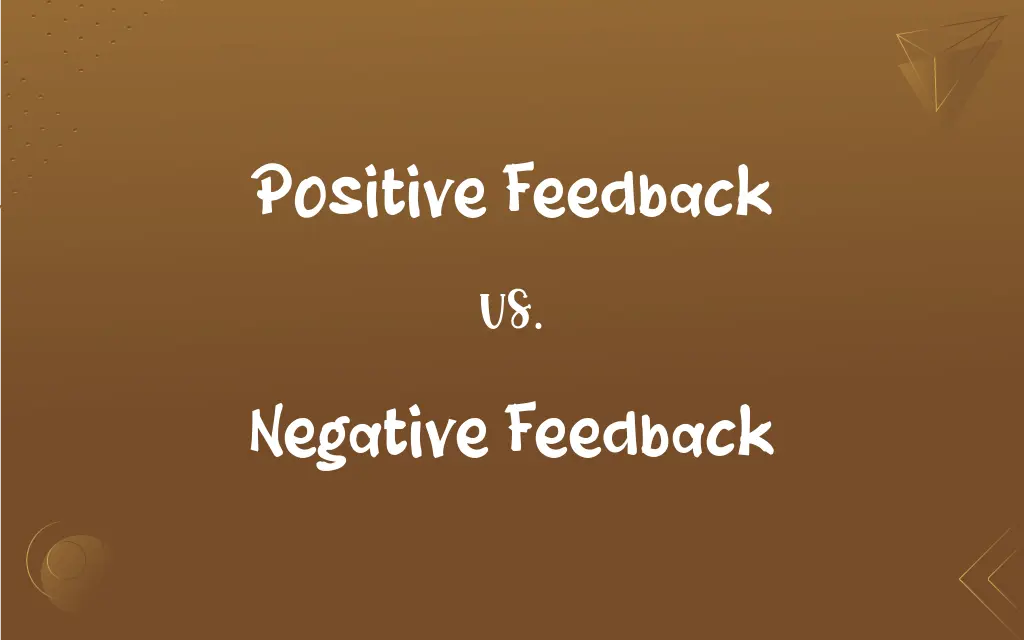Positive Feedback vs. Negative Feedback: What's the Difference?
Edited by Aimie Carlson || By Janet White || Published on January 3, 2024
Positive Feedback refers to encouraging or affirming responses that promote repeated behavior. Negative Feedback refers to constructive criticism or responses that aim to correct or reduce a behavior.

Key Differences
Positive Feedback involves reinforcement of a behavior, encouraging its repetition. This type of feedback usually results in increased morale and motivation. Conversely, Negative Feedback is aimed at correcting or improving behavior, often highlighting areas for improvement.
In a workplace setting, Positive Feedback can boost employee confidence and productivity by acknowledging their achievements. Negative Feedback, while also important, focuses on areas where employees can improve, providing guidance for better performance.
In terms of communication, Positive Feedback is often perceived as supportive and affirming, making it easier to receive. On the other hand, Negative Feedback, although potentially more challenging to deliver and receive, is crucial for personal and professional development.
In educational contexts, Positive Feedback can enhance a student's learning experience by reinforcing good practices. Negative Feedback, when given constructively, helps students identify mistakes and learn from them, fostering a deeper understanding of the subject.
Regarding emotional impact, Positive Feedback generally leads to feelings of pride and accomplishment. In contrast, Negative Feedback, if not delivered carefully, can sometimes lead to demotivation or discouragement, but when done constructively, it can be highly beneficial.
ADVERTISEMENT
Comparison Chart
Purpose
To reinforce and encourage desired behavior
To correct or improve behavior
Impact on Morale
Generally boosts morale and confidence
Can challenge but also motivate for improvement
Reception
Often received with gratitude and motivation
May be challenging to receive but is essential for growth
Common Usage
In acknowledging successes and achievements
In guiding towards better performance and correcting errors
Emotional Effect
Leads to feelings of accomplishment and pride
Can lead to introspection and a desire to improve
ADVERTISEMENT
Positive Feedback and Negative Feedback Definitions
Positive Feedback
Reinforcement of desired behavior.
Her manager's positive feedback on her project boosted her confidence.
Negative Feedback
Remarks that aim to reduce or correct undesired behavior.
The negative feedback on his behavior led to positive changes.
Positive Feedback
Appreciative input that reinforces positive outcomes.
His positive feedback on the report affirmed her approach.
Negative Feedback
Feedback that highlights areas needing correction.
The negative feedback on the project prompted a strategic rethink.
Positive Feedback
Affirmation that encourages repetition of good practices.
Receiving positive feedback made him more eager to contribute.
Negative Feedback
Critical assessment intended to foster growth.
Negative feedback in the review led to significant improvements.
Positive Feedback
Encouraging remarks that enhance motivation.
The teacher's positive feedback inspired the students to work harder.
Negative Feedback
Constructive criticism aimed at improvement.
Her supervisor's negative feedback helped her refine her skills.
Positive Feedback
Supportive communication that acknowledges success.
Positive feedback after the presentation made her feel valued.
Negative Feedback
Guidance given to rectify mistakes or inefficiencies.
He accepted the negative feedback as a chance to improve.
FAQs
Is Negative Feedback always demotivating?
Not if delivered constructively; it can be a powerful motivator for improvement.
What is Positive Feedback?
It's feedback that reinforces and encourages desirable behavior.
How should Positive Feedback be given?
Sincerely and specifically, highlighting what was done well.
Can Positive Feedback lead to complacency?
If overused, it might, but generally, it boosts morale and motivation.
Should Positive Feedback be public or private?
It depends on the context, but public recognition can be very effective.
Can Positive Feedback improve productivity?
Yes, it can significantly enhance productivity and job satisfaction.
Is it okay to give Negative Feedback in public?
Generally, it's best given privately to avoid embarrassment.
What is Negative Feedback?
Feedback aimed at correcting or improving behavior.
Does Negative Feedback always mean failure?
No, it's an opportunity for learning and growth.
Is Positive Feedback more important than Negative Feedback?
Both are equally important for balanced and effective communication.
What role does Positive Feedback play in leadership?
It's crucial for inspiring and motivating teams.
How specific should Negative Feedback be?
Very specific, to avoid misunderstandings and provide clear guidance.
What's the best way to deliver Negative Feedback?
Clearly, constructively, and with suggestions for improvement.
Can Negative Feedback damage relationships?
If not handled carefully, it can, but it's often necessary for progress.
How often should Positive Feedback be given?
Regularly, to continuously encourage and reinforce good behavior.
How can Negative Feedback be made more acceptable?
By framing it positively and focusing on solutions, not just problems.
Is Positive Feedback always true?
It should be, as insincere feedback can be easily detected and counterproductive.
Can Negative Feedback be positive?
Yes, when it helps someone grow and improve, it's positively impactful.
Can Positive Feedback be quantified?
Yes, through measurable outcomes and improvements.
What's the long-term effect of Negative Feedback?
If used correctly, it leads to continuous improvement and development.
About Author
Written by
Janet WhiteJanet White has been an esteemed writer and blogger for Difference Wiki. Holding a Master's degree in Science and Medical Journalism from the prestigious Boston University, she has consistently demonstrated her expertise and passion for her field. When she's not immersed in her work, Janet relishes her time exercising, delving into a good book, and cherishing moments with friends and family.
Edited by
Aimie CarlsonAimie Carlson, holding a master's degree in English literature, is a fervent English language enthusiast. She lends her writing talents to Difference Wiki, a prominent website that specializes in comparisons, offering readers insightful analyses that both captivate and inform.






































































